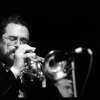Home » Jazz Articles » Album Review » Alan Wakeman: The Octet Broadcasts 1969 and 1979
Alan Wakeman: The Octet Broadcasts 1969 and 1979
In the 1970s, two bandleaders who carried the torch for British jazz were bassist Graham Collier and pianist Mike Westbrook, with both of whom saxophonist and composer Alan Wakeman toured and recorded. Wakeman has never released an album under his own name, which is a shame. The bands he put together for these two BBC-commissioned performances, broadcast once only and then left to fade in the ether, reveal an inventive and engaging composer / arranger whose individuality blossomed in the decade between them.
The 1969 performance (disc one) was made just a few years after Wakeman had left music college and, at the BBC's request, the band includes such experienced luminaries of the British scene as saxophonists Alan Skidmore and Mike Osborne, trombonist Paul Rutherford and pianist John Taylor. In deference to them, Wakeman himself takes only one brief solo. The instrumentation, arrangements and ambiance of the first and second of the three pieces, the raucous "Dreams" and the more balladic "Forever" (inspired by Victor Young's "When I Fall In Love It Will Be Forever"), are reminiscent of Charles Mingus: the first in Mingus' visceral blues and roots mode, the second with his sophisticated Duke Ellingtonian hat on. The closer, "Merry-Go-Round," a more singular Wakeman piece, is a blend of free blowing and kitsch show-tune.
The 1979 performance (disc two) features another great band, retaining Skidmore and Rutherford and with Gordon Beck replacing Taylor, Henry Lowther on trumpet replacing second trombonist Nieman and Art Themen replacing Osborne as the third saxophonist. The five-piece suite, Chaturanga, is loosely based on chess (said to have originated in India as "chaturanga"). The title tune is reminiscent of a classical raga (Wakeman had previously visited India on tour with Collier) and the three saxophonists play sopranos, evoking the sound of shenai player Bismillah Khan. It is followed by a hard-bop rooted burner, a ballad, a short head-to-head freeform clash between trombone and tenor saxophone, and another burner.
Gearbox, whose roster of young London radicals includes tenor saxophonist Binker Golding, drummer Moses Boyd and tuba player Theon Cross, has done British jazz a service with this release. It is of considerable historical interest—and also a whole heap of fun.
Track Listing
Disc One: Dreams; Forever; Merry-Go-Round. Disc Two: Chaturanga; Manhattan Variation; Vienna; Robatsch Defense; Kingside Breakthrough.
Personnel
Alan Wakeman
saxophoneAlan Skidmore
saxophoneMike Osborne
saxophone, altoPaul Rutherford
trombonePaul Nieman
tromboneJohn Taylor
pianoLindsay Cooper
bassPaul Lytton
drumsArt Themen
saxophoneHenry Lowther
trumpetGordon Beck
pianoChris Lawrence
trumpetNigel Morris
drumsAdditional Instrumentation
Disc One: Alan Wakeman: tenor saxophone, clarinet; Alan Skidmore: tenor saxophone, flute; Mike Osborne: alto saxophone, clarinet; Paul Rutherford: trombone; Paul Nieman: trombone; John Taylor: piano; Lindsay Cooper: bass; Paul Lytton: drums.
Disc Two: Alan Wakeman: tenor and soprano saxophones; Alan Skidmore: tenor and soprano saxophones; Art Themen: tenor and soprano saxophones; Henry Lowther: trumpet; Paul Rutherford: trombone; Gordon Beck: piano; Chris Lawrence: bass; Nigel Morris: drums.
Album information
Title: The Octet Broadcasts 1969 and 1979 | Year Released: 2020 | Record Label: Gearbox Records
< Previous
Johann Johannsson and Yair Elazar Glo...
Next >
The Anthony Braxton Project
Comments
Tags
In the 1970s, two bandleaders who carried a torch for British jazz were bassist {{m: Graham Collier Mike Westbrook Alan Skidmore Mike Osborne Paul Rutherford John Taylor Charles Mingus duke ellington Gordon Beck Henry Lowther Art Themen Binker Golding Moses Boyd Theon Cross
For the Love of Jazz
 All About Jazz has been a pillar of jazz since 1995, championing it as an art form and, more importantly, supporting the musicians who create it. Our enduring commitment has made "AAJ" one of the most culturally important websites of its kind, read by hundreds of thousands of fans, musicians and industry figures every month.
All About Jazz has been a pillar of jazz since 1995, championing it as an art form and, more importantly, supporting the musicians who create it. Our enduring commitment has made "AAJ" one of the most culturally important websites of its kind, read by hundreds of thousands of fans, musicians and industry figures every month.




























